MercoPress. South Atlantic News Agency
Tag: Antartica
-
Wednesday, August 21st 2024 - 05:33 UTC
HMS Protector crosses Panama Canal as it prepares for Antarctica's 2024/25 season
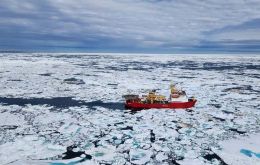
The Royal Navy’s ice patrol ship HMS Protector is swapping the high north for the deepest south after completing a successful mission to Canada’s polar waters. The Plymouth-based survey and scientific vessel usually patrols the Antarctic, but occasionally to Arctic climates to certify that she is able to operate in the icy northern regions, which are vastly different to work in despite their visual similarities.
-
Monday, April 18th 2022 - 09:13 UTC
Record high temperature recorded in Antarctica

Recent measurements in Antarctica have reflected the effects of global warming when an unprecedented 34°C temperature was detected, thus setting a new record, it was reported. The findings stemmed from sensors attached to rocks in Fildes Bay in the coastal zone.
-
Tuesday, January 4th 2022 - 05:57 UTC
Polar Preet has arrived safely at the South Pole, first woman of color to achieve such a feat

A British Army captain has made history by becoming the first woman of color to cross Antarctica unsupported. Captain Harpreet Chandi has arrived safely at the South Pole after a 700-mile trek in 40 days.
-
Friday, December 10th 2021 - 09:39 UTC
Falklands' flagged RRS Sir David Attenborough reaches “home”; anchored at Port William
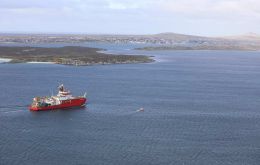
RRS Sir David Attenborough has completed the first leg of its journey to Antarctica, arriving in the Falkland Islands on 9 December. Since the draft of Britain’s new polar ship is too large for it to berth in Stanley harbor, so the ship will anchor north of the Narrows at Port William. However, the ship is visible from vantage points around the coastline.
-
Thursday, November 4th 2021 - 09:42 UTC
Ice Patrol HMS Protector sailing to Falklands and Antarctica; she called at St Helena and Rio
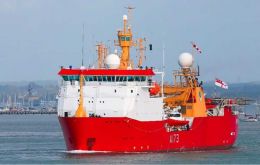
The Royal Navy's ice patrol ship HMS Protector on her trip to the Falkland Islands and Antarctica sailed past an old work colleague during a fuel stop in Rio de Janeiro earlier this week.
-
Thursday, August 5th 2021 - 20:17 UTC
US promoting Endangered Species Act for Emperor penguin colonies
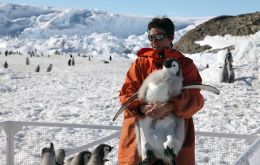
By Stephanie Jenouvrier (*) Emperor penguins thrive on Antarctica’s coastlines in icy conditions any human would find extreme. Yet, like Goldilocks, they have a narrow comfort zone: If there’s too much sea ice, trips to bring food from the ocean become long and arduous, and their chicks may starve. With too little sea ice, the chicks are at risk of drowning.
-
Monday, December 7th 2020 - 09:06 UTC
Argentina launches the 2020/21 limited Antarctica campaign, with special care o no possible coronavirus contagion
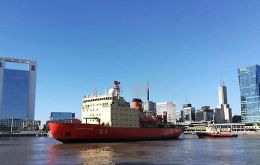
The official Argentine 2020/21 Antarctic season was launched last Friday with a ceremony at the Buenos Aires Navy pier where the icebreaker “ARA Almirante Irizar” was docked, but with no authorities boarding the vessel to avoid any possible coronavirus contagion.
-
Monday, June 8th 2020 - 07:25 UTC
End of Antarctic summer season: BAS staff and construction teams finally make it back to the UK

Almost a month after deciding on the repatriation operation, British Antarctic Survey (BAS) research and support teams are returning from Antarctica to UK after a 20-day sea voyage onboard a charter ship and the Royal Research Ship (RRS) James Clark Ross. On Saturday the MS Hebridean Sky arrived at Portsmouth International, and this Tuesday RRS James Clark Ross is expected at Harwich Port.
-
Thursday, April 30th 2020 - 07:55 UTC
Plastic pollution continues to reach sub-Antarctic islands
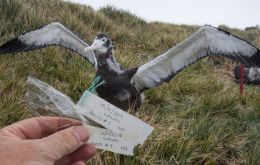
Food wrapping, fishing gear and plastic waste continue to reach the Antarctic. Two new studies into how plastic debris is reaching sub-Antarctic islands are published in the journal Environment International.
-
Wednesday, April 8th 2020 - 18:30 UTC
BAS ends Antarctic season and organizing the return: chartered ship will leave Falklands for UK 3 May

British Antarctic Survey (BAS) has announced exceptional plans to repatriate scientists, support teams and construction workers as they complete their Antarctic summer field season work.
